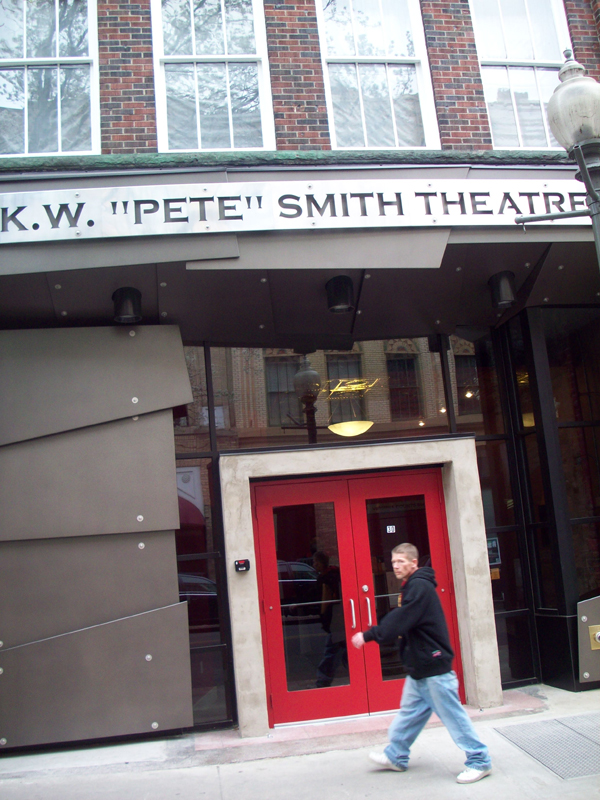by Gene Marrano
Studio Roanoke opened its doors in April 2009, a small theater space on Campbell Avenue that would cater to new plays, readings and emerging playwrights. One thought was that very new works could work out the kinks there before going on to venues like Mill Mountain Theatre just down the block. Of course Mill Mountain shut down soon thereafter when financial debt piled up – and now Studio Roanoke will do the same.
Artistic director Melora Kordos announced earlier this week that Studio Roanoke (30 Campbell Avenue) is out of business. Owner Kenley Smith, who made his money in the high performance and car-racing world before going on to pursue a masters in playwriting at Hollins University, will sell the building. Smith had named it and the theater space itself after his father and mother, Pete and Virginia.
Corporate sponsorships and grants were being counted on to cover most of the operating costs, estimated at $6000 per month or more. At the time Smith said the talk around town since Mill Mountain shut down was that arts organizations should have a solid business model, but he saw things a bit differently: “deep down theater doesn’t make sense. There’s no legitimate business reason to do theater in Roanoke. The key is the passion.”
Smith said then he had that passion, for drama, for new works, and “is just a little bit crazy.” He was the artistic director for a while after Todd Ristau gave up that role; Smith was in Ristau’s playwriting program at Hollins University. Smith had not been heavily involved with Studio Roanoke – he sunk around $500,000 in to purchasing and renovating the theater space, which had been a clothing store – for some time.
“It is not unknown that the small size of our venue made it very difficult to financially sustain ourselves on ticket sales alone,” said Kordos in a statement, “and we have been greatly dependent on grants and donations to keep our doors open. While the 2012/2013 season was looking more promising, (the largest amount of grant money awarded to the theatre to date) our private donations had tapered off to an all-time low.”
“Since it’s opening, it has brought over 30 new plays to Roanoke, showcasing some of the most exciting new writers from around the country and here in our own town. It has filled a much needed niche not just in Roanoke, but in the Commonwealth of Virginia,” noted Kordos. Now those new plays and readings will have to look for a home elsewhere, perhaps at Mill Mountain’s smaller Waldron Stage, the June McBroom stage at Community High School or at Hollins University.
Ristau had just staged Overnight Sensations on the Hollins campus, a celebration of live theater at venues like Studio Roanoke. “I think that first, and foremost, it is important to draw a distinction between the KW ‘Pete’ Smith theatre building and Studio Roanoke, which was the resident theatre company housed there,” wrote Ristau in an e-mail earlier this week. “Ken[ley] owned one and founded the other, so there are two things to be sad about–that this amazing theatre space is up for sale (and unlikely to remain a theatre space when purchased by a new owner), and also that the resident company is not in a position to continue as a viable company outside that space and without Kenley’s direct support.”
A “divergence in philosophy,” with the Studio Roanoke board of directors led to Ristau’s departure as part-time artistic director, but he continued to direct shows there and Hollins students like Samantha Macher had works produced at Studio Roanoke – her To the New Girl was the last play that opened in that space, which seated less than 100.
“I am very proud of the work we did together to open that space and provide a home for new plays and the people who create them,” added Ristau, who wished Smith well as the founder heads out of town for a new opportunity in Nashville.
The professional theater troupe GAMUT called Studio Roanoke home for a season, before settling in to the McBroom space at Community High School. “It is always sad to see dreams falter or fail. Studio Roanoke was a courageous concept that became a bold reality,” noted artistic director Miriam Frazier. “Gamut certainly understands struggling and our hearts are broken to see Studio Roanoke fold under similar struggles.”
Frazier, who just directed three GAMUT actors in an Edwards Albee play, is optimistic that, “Roanoke can certainly remain a hotbed of new plays and premiers through the strength of the playwriting program at Hollins University – but the loss of such a unique space that offered new experiences on and off-stage is a sad one indeed.” GAMUT stages three plays every season.
“Even though Studio Roanoke is closing and the building is up for sale, the commitment and support for new works by our playwriting program is actually stronger than ever,” said Ristau. “Even with the closing of that great space, those efforts by the playwright’s lab [at Hollins] will continue. I think there is cause for a lot of hope and enthusiasm for new works in Roanoke, even as we lament the closing of this innovative space. Remember that a theatre is really a reflection of the community it serves, not simply the brick and mortar where that community gathers.”


